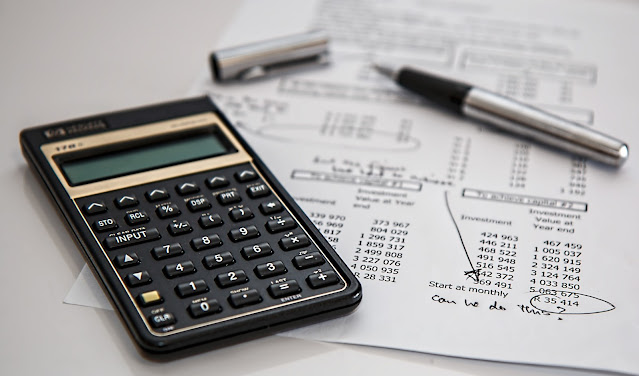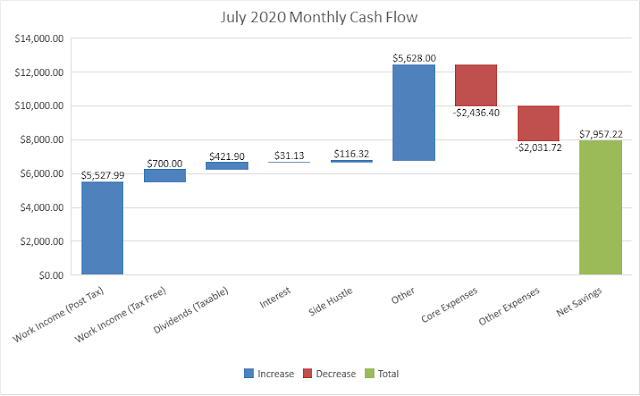Budget Check & Cash Flow Update - July 2020
 |
| Budget Check & Cash Flow Update - July 2020 |
The saying goes that cash is king. While that's true, a more accurate saying when it comes to finances is that CASH FLOW is king. Whether you're retired, still working or just starting out the only way you can improve your financial house is to have positive cash flow.
If you're in the accumulation phase then that positive cash flow allows you to save and invest to build up your future cash flow. If you're already retired, or FIREd, then congratulations because I'm sure your cash flow is well above what you need.
When it comes to personal finance it's rather simple: income - expenses = savings and savings x investing x time = financial independence. There's obviously two main levers there and while we'd all like to increase our income, many times reducing expenses is some of the low hanging fruit that you can go after to increase your savings.
Budget Check
Total income for July came in at a whopping $12,425.34 which was well above the TTM average of $8,446.96. Of course I finally got around to filing our taxes in July and we ended up with a refund of $5,628. Ooops! The bulk of my income, ~50%, came from my day job, le sigh; although that should come as no surprise since we're still in the accumulation phase. Approximately 3% came from dividends which is always nice since that required ZERO working time. Interest on our cash savings contributed another 0.3% and the remaining 0.9% came from my side hustle. The remaining 45% came from the aforementioned tax refund.
Total expenses for July came in at $4,468.12 although that included an extra $2,000 in debt payments that we made on the loan on my car. The TTM average total expenses continued to decline after July and now sits at $4,657.29.
Looking at just core expenses, July's total came to $2,436.40 which was a slight uptick from the previous 3 months but is far from out of the ordinary. Especially considering that July included our road trip to outside of Nashville as well as an unexpected dentist appointment for me. The TTM average core expenses continued to decline and is now at $3,359.39.
For the month we ended up with a net positive cash flow of $7,957.22 when looking at all income sources. Based on just work income, but including all expenses, the net positive cash flow came to $1,759.87.
Our savings rate from all income sources came to 64% while our savings rate from work income alone was 28%.
*A few notes about the cash flow check in. All income is only income that I receive and does not include my wife's income likewise for the expenses. We've found it's easiest for us to just keep separate accounts since I'm gone most of the time for work. Also, pre-tax withholding for the 401k (I currently withhold 6% in order to get the full 5% employer match) and the ESPP through my employer (4% post tax withholding) are not included in the above savings amount.
Net Work Cash Flow
While my net cash flow from above includes all income and all expenses, I wanted to get a more granular look at the cash flow that is available each month. So I started calculating my Net Work Cash Flow which is calculated at post-tax income only from my work and core expenses.
The above might be the true cash flow each month; however, it's not really representative of our "free cash flow" each month. The idea is that all other income sources outside of work income are already going directly into savings or investing or in the case of dividends remaining in the brokerage account. On the expense side the majority of our expenses fall into the core side and most of the other expenses are extra debt payments rather than further discretionary spending.
Moving forward, I believe this gives a better idea of our cash flow each month that can/will be used for debt reduction, saving and investing.
My net work cash flow continued to be quite strong in July with $3,791.59. What's really crazy is that despite the reduction in income due to my new work role, my net work cash flow is still in line with the levels when my income was higher due to much lower expenses. Our 6-month moving average for our net work cash flow is holding strong and if we can keep this up then we'll be back to regular investing soon. The 6-month moving average for our net work cash flow comes to $3,866.67.
Non-Work Cash Flow
Passive income for July totaled $453.03 and covered 18.6% of core expenses. Meanwhile, non-work income totaled $6,197.35 and covered 254.4% of core expenses for July although that includes the one time income tax refund. Excluding that and non-work income falls to $569.35 with a core expense coverage of 23.4%.
Conclusion
With four full months in my new job role I believe there's a solid baseline to start extrapolating from. The great news is that while income is down which is a bummer, expenses are down significantly which has kept our "monthly take" pretty close to pre-change levels.
My average net work cash flow over the last 4 months has come in at at ~$3,000 per month. Think of that as our "free cash flow" that can then be allocated however we see fit.
While I'd love to throw it all towards debt reduction, I'm not sure if that's the path we'll take although that would get the car loan debt eliminated by November which sure would be nice. Realistically I think a better approach would be somewhere in the 50/50 range split between debt reduction and the brokerage account. That would push the payoff date back until roughly March 2021, but it would also come with an extra ~$10k or so that could be invested over that time as well.
This is likely to be a fluid situation although I'm thinking a 50/50 split is probably the best balance moving forward with any additional cash flow going towards debt reduction.
One thing I do know is that I'm not planning on prioritizing additional cash savings at this time since our emergency fund is someone in the area of 1 year of expenses and 16 months of core expenses which is a great place to be.
Make sure you sign up to receive new posts to your email so you don't miss anything. And be sure to follow me on Twitter @JC_PIP to get up to the minute news of purchases for my portfolio or if you prefer Pinterest or Facebook I'm on there too.
If you were in our situation would you funnel all cash flow towards debt reduction or splitting the difference like I'm leaning towards?



Wow, damn cool that your work cash flow didn't change in July. Unfortunately, I'm not doing so well...
ReplyDelete